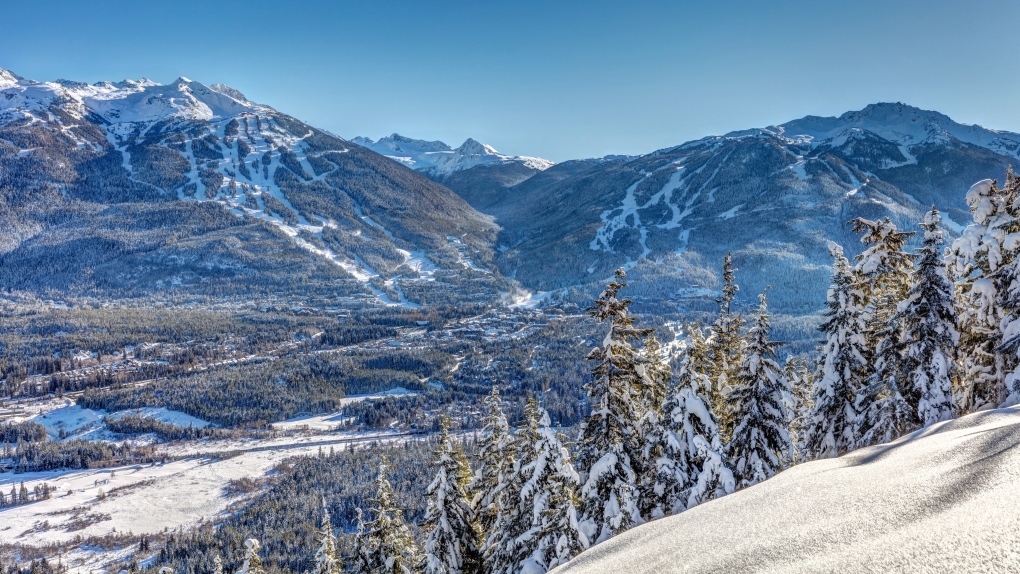Whistler, parts of Vancouver Island and Kootenay region see heavy snow
 Whistler and Blackcomb mountains are seen in the winter. (Shutterstock.com)
Whistler and Blackcomb mountains are seen in the winter. (Shutterstock.com)
Snowfall and wind warnings remain in effect for eastern Vancouver Island, Whistler, Howe Sound and the Boundary and Kootenay regions as parts of British Columbia deal with heavy snow, freezing rain and high winds this weekend.
Environment Canada says around 16 centimetres of snow have fallen along the Sea to Sky highway since Friday night, with 10 centimetres around Whistler.
The weather office says the heaviest snowfall is expected to ease later Saturday afternoon, but flurries are forecast to continue overnight.
Meanwhile, the agency says a low pressure system is bringing a mix of rain and snow to the east coast of Vancouver Island near sea level, while areas at higher elevations could see a few more centimetres of snow accumulate during the afternoon.
To the east, in the Boundary and Kootenay regions, Environment Canada says up to 15 centimetres of snow could fall before tapering off to flurries in the evening.
B.C.'s Transportation Ministry had issued a statement warning motorists to be prepared for poor driving conditions as a result of snow, freezing rain and high winds throughout the Fraser Valley and Sea-to-Sky regions Friday night.
The province says highway maintenance crews were “out in full force” preparing roads and getting ready to manage snow.
It adds that high avalanche risk in the Jackass Mountain area prompted the closure of Highway 1 through the Fraser Canyon Friday evening, with an option for local traffic to travel from Hope to Boothroyd during the closure.
The ministry says additional routes may be closed with little or no notice, depending on the weather and road conditions.
This report by The Canadian Press was first published Dec. 9, 2022.
CTVNews.ca Top Stories

Canadians across the country mark Remembrance Day
Today Canadians will remember and honour the sacrifice of men and women in uniform who gave their lives in service of the country's values and principles.
Family of Second World War veteran killed in France shares his life and legacy
Two nephews of the beloved Harry R. Hamilton share stories about his life and legacy.
Trump announces Tom Homan, former director of immigration enforcement, will serve as 'border czar'
U.S. President-elect Donald Trump says that Tom Homan, his former acting U.S. Immigration and Customs Enforcement director, will serve as "border czar" in his incoming administration.
Why brain aging can vary dramatically between people
Researchers are uncovering deeper insights into how the human brain ages and what factors may be tied to healthier cognitive aging, including exercising, avoiding tobacco, speaking a second language or even playing a musical instrument.
Bleeding and in pain, a woman endured a harrowing wait for miscarriage care due to Georgia's restrictive abortion law
Since the U.S. Supreme Court’s 2022 Dobbs decision eliminated the federal right to abortion, miscarriage management has become trickier and in some cases, deadlier.
Montreal dockworkers reject deal with lockout to begin
The union representing some 1,200 dockworkers at the Port of Montreal has overwhelmingly rejected a deal with their employers association.
His wife was swept away by Hurricane Helene’s floodwaters. Now he’s been scammed out of nearly US$40,000
Rod Ashby was desperate to find his wife Kim Ashby after their newly built home in Elk Park, North Carolina, was swept away by Hurricane Helene’s floodwaters in late September and she went missing.
Canadian veterans remember how they eased tensions as UN peacekeepers in ethnically split Cyprus
It was the first time that Canadian UN peacekeeper Michelle Angela Hamelin said she came up against the raw emotion of a people so exasperated with their country's predicament.
Trump nominates Rep. Elise Stefanik for UN ambassador
U.S. President-elect Donald Trump has nominated Republican Rep. Elise Stefanik to be UN ambassador.
































